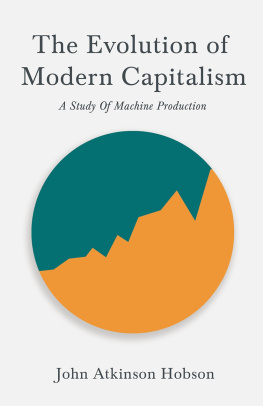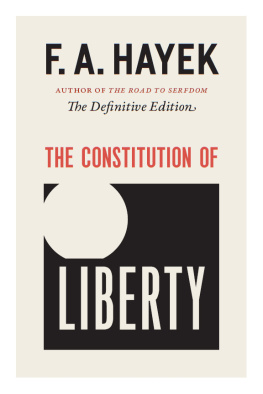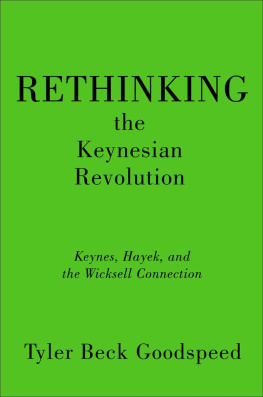The University of Chicago Press, Chicago 60637
The University of Chicago Press, Ltd., London
2018 by The University of Chicago
All rights reserved. No part of this book may be used or reproduced in any manner whatsoever without written permission, except in the case of brief quotations in critical articles and reviews. For more information, contact the University of Chicago Press, 1427 E. 60th St., Chicago, IL 60637.
Published 2018
Printed in the United States of America
27 26 25 24 23 22 21 20 19 18 1 2 3 4 5
isbn-13: 978-0-226-55600-0 (cloth)
isbn-13: 978-0-226-55614-7 (e-book)
doi: https://doi.org/10.7208/chicago/9780226556147.001.0001
Library of Congress Cataloging-in-Publication Data
Names: Beck, Naomi, 1975 author.
Title: Hayek and the evolution of capitalism / Naomi Beck.
Description: Chicago ; London : The University of Chicago Press, 2018. | Includes bibliographical references and index.
Identifiers: lccn 2017060710 | isbn 9780226556000 (cloth : alk. paper) | isbn 9780226556147 (e-book)
Subjects: lcsh: Hayek, Friedrich A. von (Friedrich August), 18991992. | Free enterprise. | Capitalism.
Classification: lcc hb101.h39 b435 2018 | ddc 330.12/2dc23
LC record available at https://lccn.loc.gov/2017060710

This paper meets the requirements of ansi/niso z39.48-1992 (Permanence of Paper).
F. A. Hayek the Avant-Garde Conservative
The Nobel Laureate in economics Friedrich August von Hayek was undoubtedly one of the most consequential thinkers in the second half of the twentieth century. He influenced leading economists such as Milton Friedman, who together with his wife, Rose (1988), defined three tides that have characterized social and economic development since the eighteenth century: the Adam Smith tide, the Fabian tide, and the Hayek tide. Within the discipline of economics, Hayek ranks second among the most frequently mentioned Nobel Laureates in fellow recipients prize lectures (after Kenneth Arrow), and he ranks second in publication citations (Skarbek 2009). His work also influenced prominent policy makers. A famous anecdote tells that in 1975, Margaret Thatcher interrupted a Conservative Party debate by banging The Constitution of Liberty (1960) on a table and exclaiming, This is what we believe! According to some (Henderson 2005; Yergin and Stanislaw 1998), the Thatcher and Reagan revolutions of the 1980s, and the globalization processes of the 1990s, provide evidence of the dominance of Hayeks views on economic policy.
Hayeks defense of the free market continues to hold sway today. In the wake of the 2008 financial crisis, there was a renewed interest in the heated controversy between Hayek and John Maynard Keynes over the role of government in the economy. Their debate even became the theme of two rap videos posted on Youtube. Then in June 2010, Hayeks book The Road to Serfdom (1940) reached the top of the sales list on Amazon.com. The influence of his ideas has extended well into the electronic age of information technology in the twenty-first century. Jimmy Wales, the founder of Wikipedia, claimed (see Mangu-Ward 2007), One cant understand my ideas about Wikipedia without understanding Hayek, further specifying that Hayeks article The Use of Knowledge in Society(1945) is central to his own thinking about how to manage the Wikipedia project. In this article, as Wikipedias entry under the same title recounts, Hayek argues that information is decentralized: each individual knows only a small fraction of what is known collectively. As a result, decisions are best made by those with local knowledge rather than by a central authority. Wikipedia indeed puts into practice the belief that the most comprehensive and objective view is furnished by multiple contributors rather than a handful of specialists.
Without detracting from Hayeks success, briefly reviewed above, it is also true that his reputation has suffered considerable lows. In 2004, Virginia Postrel wrote a piece entitled Friedrich the Great for the Boston Globe in which she proposed to reintroduce to her readers one of the most important thinkers youve barely heard of. Postrel argued that well-educated, intellectually curious people in the United-States who nod at mentions of the likes of Max Weber, Hannah Arendt, or Michel Foucault hardly know who Hayek was. In the same article she quotes Hayek biographer Bruce Caldwell, who explains: For most of his life, Hayeks economic and political positions were completely out of sync with those of the rest of the intelligentsia... [and] for much of the century he was a subject of ridicule, contempt, or, even worse for a man of ideas, indifference. Initially, this situation was the result of the hegemony of Keyness view. Later on, it was the price Hayek had to pay for his opposition to the new brand of economics that emerged after World War II, and for his move away from technical analysis to wide-ranging interdisciplinary research.
Hayek was destined to become Keyness formidable opponentor at least this was the intention of Lionel Robbins, the director of the London School of Economics, who nominated Hayek for a professorship at the age of thirty-two in the hope that he would help counter the influence of Keynes and his colleagues at Cambridge University. But Hayek lost the battle then, while Keyness star continued to rise. In the mid-1940s, Hayek recalled (1994, 103), Keynes died and became a saint; and I discredited myself by publishing The Road to Serfdom. This highly popular book marks a turning point in Hayeks career. On the one hand, its immense and unexpected success, especially in the United-States, brought Hayek worldwide recognition and a professorship at the University of Chicago. On the other hand, The Road to Serfdom cornered him into the position of an ideological warrior against socialism instead of a cutting-edge economist. The Nobel Laureate in economics Paul Krugman pithily commented in his New York Times blog (December 5, 2011) that without The Road to Serfdom, which struck a chord with the American Right, nobody would be talking about Hayeks theories. The Hayek thing, Krugman concluded, is almost entirely about politics rather than economics, his ideas having long vanished from the professional discussion.
Hayek was indeed an unconventional economist who veered away from technical analysis relatively early in his career in order to pursue epistemological, philosophical, and ethical questions. As one of Hayeks scholars explained (see Boettke 1999), while the scientific fashion was moving the disciplinary circles further apart and narrowing the areas of intersection, Hayeks main research interests were to be found exactly in those points of intersection. He was drawn to questions related to the methodology of the social sciences, the psychology of the human mind, the philosophical and historical foundations of liberalism, and the evolution of civilization. Unfortunately, his intellectual home in the 1950s, the University of Chicago, was to become the bastion of a view of economics that Hayek did not share. In 1953, Milton Friedman published his influential Essays in Positive Economics, gaining ascendance as the leading voice of the new Chicago school of economics. Around the same time, Hayek reissued a series of articles under the title


 This paper meets the requirements of ansi/niso z39.48-1992 (Permanence of Paper).
This paper meets the requirements of ansi/niso z39.48-1992 (Permanence of Paper).










